Politicians court US-Asians amid anti-China sentiment
Updated: 2013-11-08 00:04
By Kelly Chung Dawson in New York (China Daily)
|
||||||||
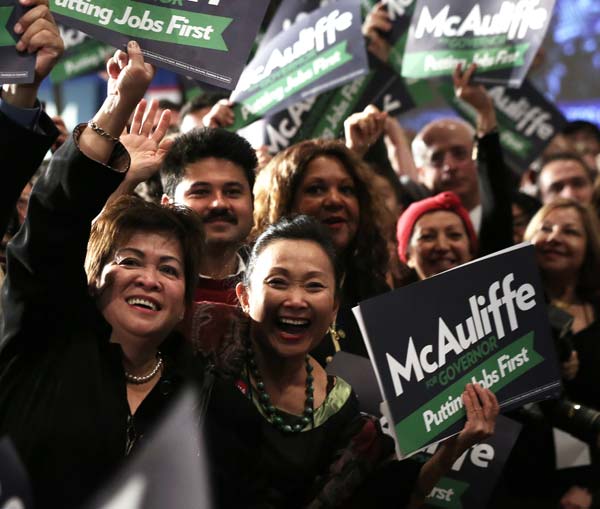 |
|
Supporters of Virginia gubernatorial candidate Terry McAuliffe celebrate as they see on TV that McAuliffe is leading in the polls during his election-night event on Tuesday at the Sheraton Premiere Hotel in Tysons Corner, Virginia. Virginians narrowly elected McAuliffe, a Democrat, over Republican Ken Cuccinelli to succeed Republican Bob McDonnell. Alex Wong / Getty Images via AFP |
Asian-Americans are the fastest-growing ethnic group in the United States, and politicians are increasingly scrambling to reconcile a need to appeal to them with a lingering anti-China sentiment that reached a climax in the 2010 midterm elections.
In that year, at least 29 candidates ran advertisements featuring imagery and messages related to China's economic rise at the supposed cost of US jobs. The most infamous advertisement featured a Chinese professor speaking in subtitled Mandarin to a classroom of the future, recounting America's downfall: "Of course, we owned most of their debt — so now they work for us," the professor said to a room full of laughing Chinese students.
But in 2012, nearly 4 million Asian-Americans voted in the general election, representing a 91 percent increase from 2000. According to a Pew study, Asian-Americans have surpassed Hispanics as the largest group of new immigrants in the US. Asian votes are increasingly important to a politician's success, in an atmosphere that still often blames China for a lack of jobs.
In this year's elections, the two gubernatorial candidates and one mayoral candidate who won the three places polled by the Asian American Legal Defense and Education Fund — New York City, Virginia and New Jersey — all did major outreach in Asian communities, said Glenn Magpantay, director of the fund's democracy program. Bill de Blasio, Terry McAuliffe and Chris Christie spent significant time attending events, meeting with community leaders and doing phone-bank outreach among potential Asian-American voters, he said.
While it's difficult to prove the link between a rising awareness of the Asian-American electorate and the marked decrease in anti-China messaging in this year's political campaign strategies, the GOP in particular has become more cognizant of the need for culturally sensitive campaigning, said James Lai, an associate professor of ethnic studies and political science at Santa Clara University. When 72 percent of Asian-Americans voted for Barack Obama in 2012, the GOP realized a need to appeal to minority populations, he said.
"The white vote isn't enough anymore," he said. "There used to be no deliberate differentiation between anti-China messaging and Chinese-Americans, but GOP leaders are thinking more about whether Asian-American voters will be negatively impacted."
An increasingly active social media culture that's more likely to publicize political missteps has also contributed to more nuanced attitudes toward the handling of foreign policy and race in politics, said Karthick Ramakrishnan, an associate professor of political science at the University of California, Riverside and the overseer of the National Asian-American Survey.
"There's a new norm today and a greater sensitivity toward not making connections between Asian-Americans and foreign policy toward China," he said. "If something is clearly shown to be related to a foreign country, politicians can get away with more — but if a link is made with people of that culture living in the US, you're more likely to see push back."
In 2010, Ohio US Democratic Representative Zack Space ran an ad in which he accused Republican rival Bob Gibbs of being a "free trader" who had contributed to 91,000 jobs lost in the state to China. The advertisement featured images of San Francisco's Chinatown, in an overt attempt to bring the threat closer to home. That type of ad would be less likely to run today, Ramakrishnan said.
Still, advertisements in this year's off-cycle election have included clumsy attempts to use Asian imagery for unclear purposes: In South Pasadena, California, City Council hopeful Philip Putnam ran print advertisements featuring an image of himself standing among rows of Terracotta Warrior statues under the slogan "Not Like the Rest of the Crowd." In a city where Asian voters comprise 35 percent of the population, the potential implication of his message is that his whiteness sets him apart.
In Virginia, where voters of Hispanic, black and Asian backgrounds helped win the state for Obama in 2008 and 2012, the Republican National Committee ran a 30-second advertisement on a Korean-language cable station last weekend targeting Terry McAuliffe for having links to a company currently under federal investigation for allegedly defrauding Asian investors.
The advertisement, which was part of a $90,000 push to reach Asian-American voters across print, TV and radio in various Asian languages, was an attempt to improve negative perceptions of the Republican candidate, a previously vocal anti-immigration hard-liner. The disconnect between what the Republican National Committee hopes to project and what individual Republican candidates actually represent has proved to be a problem, Ramakrishnan said.
Although the Democratic party has generally demonstrated more awareness of the minority vote, candidates on both sides of the aisle have made major missteps, including an incident earlier this year in which the pro-Democratic group Progress Kentucky pointed fingers at Senator Mitch McConnell's Chinese-American wife, former secretary of labor Elaine Chao, for supposedly persuading him to move American jobs to China.
The current trend toward softened anti-China messaging is not necessarily permanent, Magpantay said.
"Even today, when there is a backlash against culturally insensitive campaign messaging, it's generally not from the demographic the candidate is trying to reach," he said.
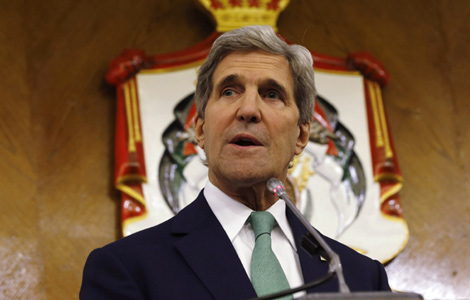
 Kerry to join Iran nuclear talks in bid to reach deal
Kerry to join Iran nuclear talks in bid to reach deal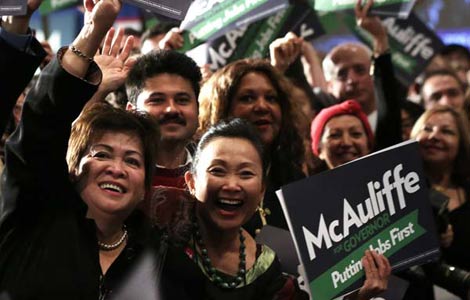
 Politicians court US-Asians amid anti-China sentiment
Politicians court US-Asians amid anti-China sentiment
 Britain remembers war dead
Britain remembers war dead
 Stolen newborn returned to family
Stolen newborn returned to family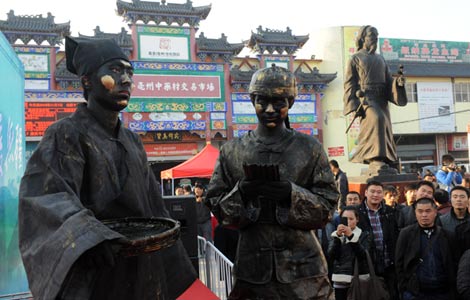
 TCM firms should 'learn rules of West'
TCM firms should 'learn rules of West'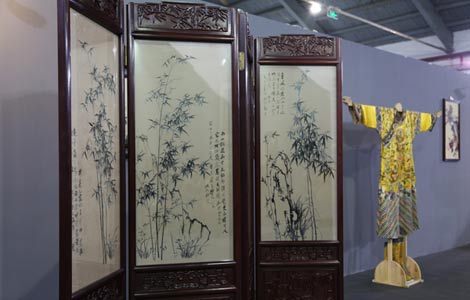
 Artists see big picture in CBD's art zone
Artists see big picture in CBD's art zone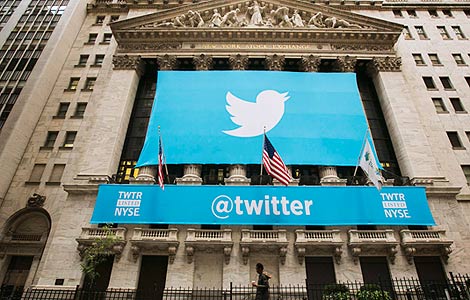
 Twitter shares soar 92% in frenzied NYSE debut
Twitter shares soar 92% in frenzied NYSE debut
 Fly with the Jetman
Fly with the Jetman
Most Viewed
Editor's Picks

|

|

|

|

|

|
Today's Top News
China should allow for higher inflation: economist
CIA paying AT&T to provide call records - NYT
Li vows growth, reform balance
Sister cities step up business
Bank exec describes meeting with Li Keqiang
Russian meteor studied for clues to next one
Twitter soar 92% in NYSE debut
Overseas Chinese chase opportunities at home
US Weekly

|

|






